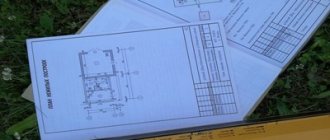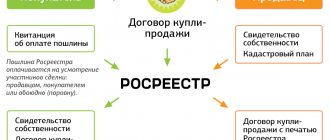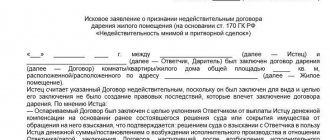A garden book is a document confirming membership in a gardening partnership. The SNT participant is granted the right to use a garden plot of land. However, this legal status of the land limits the owner’s ability to dispose of the land at his own discretion. Thus, without formalizing privatization, a member of the SNT will not be able to conduct transactions for the alienation of the site.
A plot of land with an uncertain legal status and without the necessary title documents is valued cheaply. But most purchasers do not think that in order to carry out the procedure for legitimizing and registering land ownership, large time and financial costs will be required.
The most common situation is when the seller of the plot has only a garden book among all the title documents. Is it worth buying such plots? What consequences should you be wary of when purchasing land using a garden book? Let's look at it in detail below.
Is it worth buying a plot of land using a garden book?
If the owner has not taken care of registering the plot of land he owns, then he will only be able to present a garden book as a title document during the sale.
The mechanism for transferring the right to use a site is quite simple. The acquirer of the land, together with the seller, writes an appeal to the management of the partnership about joining the partnership and, accordingly, about leaving it. A garden book is issued in the name of the new user. But this procedure does not give you any rights to dispose of property.
The positive features of such a simplified scheme for purchasing a garden plot are as follows:
- low cost of land plots in comparison with equivalent plots that have undergone the privatization procedure;
- transfer of the right of use does not require notarization;
- efficiency of concluding a transaction (in a short time you become the owner of a garden plot).
Significant disadvantages of purchasing land using a garden book include:
- you do not have the right to conduct transactions for the alienation of SNT land;
- you will have to deal with procedural issues related to transferring money and recording this fact yourself at your own peril and risk;
- when registering land ownership, it is necessary to collect a large number of documents confirming this right, and it is possible that lost information about the site will have to be restored through the court;
- the process of privatization of such lands, as a rule, is lengthy;
- Since the booklet confirming membership in SNT does not undergo state registration and notarization, there is no guarantee that the same document will not be issued (or has not already been issued) to another user.
In the latter case, you will have to prove your right to land in court.
Based on the above, most qualified lawyers advise against purchasing land on the basis of a garden book, despite the attractive price of such offers.
If you nevertheless decide to purchase a plot without title documents, then use the following recommendations:
- make sure that the former user of the land formally exits the SNT and pays all necessary fees;
- write an appeal to the authorized body of the board of SNT about including you among the participants of the partnership;
- make sure that your membership in SNT is formalized by a protocol decision of the general meeting of the partnership participants;
- take from the seller a document (receipt) confirming receipt of funds for a plot of land (if the transfer of money took place in the presence of witnesses, ask them to also put an certifying signature on the receipt);
- consult in advance about the possibility of registering a dacha plot as private property, and find out whether this procedure is planned on a collective basis (privatizing SNT lands in a general manner is easier and cheaper than carrying out this procedure independently);
- if the prospects for registering the land are more than vague, insist that the seller carry out the privatization procedure for the plot independently and then transfer the land to you as part of the purchase and sale agreement. This mechanism will give you confidence that your rights to the site will not be challenged.
Who sells a dacha using a gardener's membership card?
Among the owners of suburban areas there are those who are far from preparing documents and are not ready to spend extra money on it. There is a gardener's membership card - and that's enough. And when they need money, they sell their dacha for pennies, which, let’s say, was inherited from their grandfather.
After all, registering a plot of land and a house through Rosreestr, as expected, requires time and money; you need to contact a cadastral engineer, run through the authorities, and find out everything. Many owners simply don't want to deal with this paperwork. It’s easier to sell the dacha cheaper - and then let others sort it out.
By the way, in order to simplify the registration of land plots, they came up with a dacha amnesty - the opportunity to register rights to a land plot in public ownership before March 1, 2022, according to information from the archive, including the gardener’s membership book.
What does it mean to buy a plot using a garden book?
Please note that by purchasing a plot using a garden book, you are acquiring membership in a gardening partnership, and not ownership of the land. This fact proves the riskiness of such transactions.
You should be alerted by the fact that the seller, of all the title documents, only has a booklet confirming membership in a gardening association.
Is it worth buying land in DNP?
Is it worth buying land in a cottage community? Read here.
Is it worth buying land without land surveying? Read the link:
As a rule, this means that some problems arose with the privatization of the land being sold, otherwise the seller himself would have registered ownership of the land. This would be much more profitable for him, since the cost of legalized plots is much higher than unregistered ones.
The owner of SNT lands is the local government body on whose territory these plots are located. In this case, you can find out about the possibility of privatization of such lands from the local administration. Perhaps these areas are encumbered and restricted in circulation, or there is an easement.
What should you consider when buying a summer house?
First of all, you need to pay attention to the property documents. When registering real estate transactions, Rosreestr experts formulated a list of rules that should be followed when selecting a real estate option for purchase.
A dacha, like any other real estate, should be purchased only from the owner and nothing else! Evidence of a registered right is a certificate of right or an extract from the Unified State Register of Real Estate. These documents have equal legal force.
The bottom line is that from July 2021, a certificate of title was issued as a title document; after that date, an extract from the Register of Rights was issued. Therefore, the seller of the dacha must have one of the specified documents in his hands.
The procedure for purchasing a plot using a garden book
The main distinguishing feature of a transaction for the acquisition of a plot on the basis of an SNT book from a standard sale and purchase is the legal status of the parties to the transaction. In the first case, the subject of the transaction is, in fact, joining the SNT, and in the second - obtaining a plot of land on the right of ownership.
The algorithm for purchasing land using a garden book is as follows:
- ask the chairman of the gardening association for a plan for cadastral registration of the land plot (if it is not available, it is recommended to refrain from purchasing the plot);
- ask the land seller for a document confirming the absence of arrears on membership fees;
- talk with the owners of neighboring plots about the possibility of conducting land surveys and registering ownership rights, find out if they have any complaints about the boundaries of the land plot being sold;
- enter into an agreement for the purchase of land and indicate in it all the characteristics of the buildings on the site (to confirm that you are acquiring all rights not only to the land, but also to the objects built on it);
- have the contract for the purchase of land and the receipt for the transfer of money notarized (this procedure is not mandatory, but its implementation will allow you to protect yourself in case of fraudulent actions on the part of the seller);
- submit an application to the SNT board with a request to include you in the list of participants.
If the seller only has a garden book, is it worth buying such a dacha?
“I only have a garden book,” says the seller, “but the plot is privatized.” This option for selling a dacha occurs in practice in every second case. A member of SNT, who has only a garden book in his hands, offers to complete a purchase and sale transaction for his dacha by entering the buyer in the garden (membership) book after the latter gives him the money.
Such an offer should be rejected immediately, since a garden book (gardener’s book) is not a document of title and only confirms the seller’s membership in a specific SNT. By entering his name in the garden book, the buyer becomes a member of the SNT, but not the legal owner of the purchased dacha. In addition, it may later turn out that the seller himself is not the legal owner of the dacha, since the previous owner did not have the right to sell it.
It is important to check the type of permitted use of the land
The documents need to check whether the land is actually being used in accordance with its purpose. According to the law, residential buildings can be built on the lands of populated areas and agricultural lands. In this case, the plot can be allocated for individual housing construction, personal farming, gardening, summer cottage farming/construction. Most villages in the suburbs of Krasnoyarsk are built on agricultural lands with permitted use for summer cottage construction.
In addition, it is important to find out what the prospects are for the territory on which the dacha is located, so you will insure yourself against possible unpleasant surprises in the future. If the authorities recognize that the city will need the site for development, for example, a road should pass through it, it can be seized for municipal needs. Then the owner will be paid the redemption price for the property he owns. Ideally, the buyer should study the master plan for the development of the territory where he is buying a plot (provided that the locality has one). The general plan of Krasnoyarsk is published on the city administration website (www.admkrsk.ru).
If buyers follow these expert tips, they will not become the owners of a “pig in a poke.” They will not have to defend their rights in court and bear the associated costs.
Checking the boundaries of the land plot is mandatory
It is very important to check whether the plot has been surveyed, because otherwise you may become the owner of a plot of land over which there are disputes between neighbors.
The law, which requires mandatory land surveying, has not come into force; plots with undefined boundaries can be sold today, but experts advise buyers not to agree to purchase such land.
Buying a plot without land surveying is fraught with serious risks for the buyer; it may then turn out that the area of land is much smaller than what the seller stated. “Several years ago, one of the buyers purchased a plot of land, which, according to documents, was nine acres, and after measurements were taken, its area was reduced to five acres,” says Denis Sheshko. — It turns out that the buyer overpaid for the plot. Moreover, after the transaction, he will no longer be able to make any claims to the seller. When preparing for a transaction, I would recommend contacting cadastral engineers and carrying out land surveying. Of course, this will take time and additional costs, but the buyer will have a complete understanding of what exactly he is paying for.”
You can check whether a plot has a land survey or not on the public cadastral map on the Rosreestr website; it displays information about all plots included in the Unified State Register of Real Estate. If land surveying has been done, the site has boundaries on this map. On the same map you can see that the site falls into a zone with special conditions for the use of the territory, for example, a water protection zone.
Make sure no one else is vying for the dacha
In order to sell a dacha, you will need the consent of the seller’s spouse to carry out the transaction, certified by a notary. It is necessary to receive it, because the spouse who did not consent to the transaction has the right to later demand that the transaction be declared invalid in court. If the seller has recently divorced and less than three years have passed since the divorce, a notarized agreement on the division of joint property or a court decision on division will be required. It should say that the second spouse has no rights to the dacha.
When a dacha is sold by power of attorney, you need to make sure that the power of attorney was actually issued. You can check it on the website of the Federal Notary Chamber (www.notariat.ru). The register of issued powers of attorney is publicly available here, and anyone can check the legality of this document. To do this, you need to know the last name, first name, patronymic of the principal, the date of the power of attorney or its number. If information about it is in the register, it means that such a power of attorney was actually certified by a notary. If you cannot find a power of attorney with such details, it means it does not exist.










